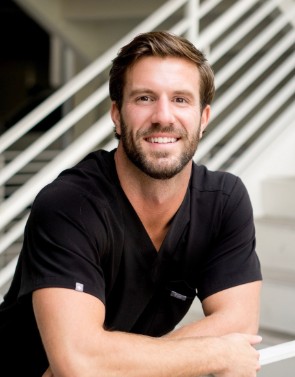Early Dental Care
Teething
Normally the first tooth erupts between ages 6 to 12 months. Gums are sore, tender and sometimes irritable until the age of 3. Rubbing sore gums gently with a clean finger, the back of a cold spoon or a cold, wet cloth helps soothe the gums. Teething rings work well, but avoid teething biscuits—they contain sugar that is not good for baby teeth.
While your baby is teething, it is important to monitor the teeth for signs of baby bottle decay. Examine the teeth, especially on the inside or the tongue side, every two weeks for dull spots (whiter than the tooth surface) or lines. A bottle containing anything other than water and left in an infant’s mouth while sleeping can cause decay. This happens because sugar in the liquid mixes with bacteria in dental plaque, forming acids that attack the tooth enamel. Each time a child drinks liquids containing sugar, acids attack the teeth for about 20 minutes. When awake, saliva carries away the liquid. During sleep, the saliva flow significantly decreases and liquids pool around the child’s teeth for long periods, covering the teeth in acids.
Your infant’s new teeth
The primary, or “baby,” teeth play a crucial role in dental development. Without them, a child cannot chew food properly and has difficulty speaking clearly. Primary teeth are vital to development of the jaws and for guiding the permanent (secondary) teeth into place when they replace the primary teeth around age 6.
The way your child cares for his/her their primary teeth plays a critical role in how he/she they treats their permanent teeth.
Why primary teeth are important
Primary teeth are important for several reasons. Foremost, good teeth allow a child to eat and maintain good nutrition. Healthy teeth allow for clear pronunciation and speech habits. The self-image that healthy teeth give a child is immeasurable. Primary teeth also guide eruption of the permanent teeth.
Good diet and healthy teeth
The teeth, bones and soft tissue of the mouth require a healthy, well-balanced diet. A variety of foods from the five food groups helps minimize (and avoid) cavities and other dental problems. Most snacks that children eat cause cavities, so children should primarily receive healthy foods like vegetables, low-fat yogurt and cheeses, which promote strong teeth.
Infant tooth eruption
A child’s teeth actually start forming before birth. As early as 4 months of age, the primary or “baby” teeth push through the gums—the lower front teeth are usually first, then the uppers. The remainder of the 20 primary teeth typically erupt by age 3, but the place and order varies.
Permanent teeth begin eruption around age 6, starting with the first molars and lower central incisors. This process continues until around age 18-21. Adults have 28 secondary (permanent) teeth—32 including the third molars (wisdom teeth).
How to prevent baby bottle tooth decay
Tooth decay in infants can be minimized or totally prevented by not allowing sleeping infants to breast or bottle-feed. Infants that need a bottle to comfortably fall asleep should be given a water-filled bottle. Our office is dedicated to fighting baby bottle tooth decay. Let us know if you notice any signs of decay or anything unusual in your child’s mouth.
“No more than one cup of juice a day. Water is always best.”

Pediatric Dentist




